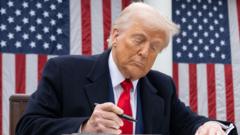In a surprising twist, Donald Trump has decided to temporarily halt the implementation of increased tariffs, allowing markets to stabilize while entering negotiations with various nations.
Trump Hits the Pause Button on Global Tariff Plans

Trump Hits the Pause Button on Global Tariff Plans
President’s decision to delay higher tariffs alleviates fears of an economic crisis.
For days, President Donald Trump and his administration confidently maintained a firm stance on their plans to impose sweeping "reciprocal" tariffs on several nations. However, after public discontent surged, the White House has now confirmed that a pause on rising tariff rates will take effect, albeit with a few critical exceptions. This recent development causes a temporary halt to the reconfiguration of the global economic landscape and stalls Trump’s vision of revitalizing American manufacturing.
Amid growing investor panic and a shaky bond market, notable government officials claim that this deceleration was anticipated as part of a broader strategy. Treasury Secretary Scott Bessent stated that negotiations with over 75 nations were already underway and were expected to expand post-announcement.
Despite previous commitments, Trump's aides quickly pivoted to highlight the success of the administration's approach. Trade adviser Peter Navarro confidently echoed that the trade situation had "unfolded exactly as planned," while press secretary Karoline Leavitt insisted the whole world was engaging with the U.S. in newfound collaboration.
Despite the enthusiasm from the White House team, clarity surrounding the tariff suspension remained murky for several hours, leaving allies uncertain about the specifics of the decision. Key questions persisted regarding the inclusion of the EU and neighboring Canada and Mexico in the temporary reprieve.
Trump himself acknowledged the market's unstable condition but defended the need for the announcement, attributing economic discomfort to longstanding issues in the American economy. In contrast, Democrats harshly criticized the president, with Senate Minority Leader Chuck Schumer stating he was "governing by chaos" and insinuating that Trump's decision was a sign of retreat.
In the grand scheme, the U.S. is shifting back toward cooperation with countries affected by prior retaliatory measures while tightening its grip on China, which now faces up to 125% tariffs. The implications of this reshuffling may alter U.S. foreign policy dynamics moving forward. Nonetheless, the uncertainty surrounding Trump's next steps is palpable. As the 90-day tariff pause countdown begins, it remains to be seen whether the fallout from recent developments will complicate ongoing diplomatic efforts.





















